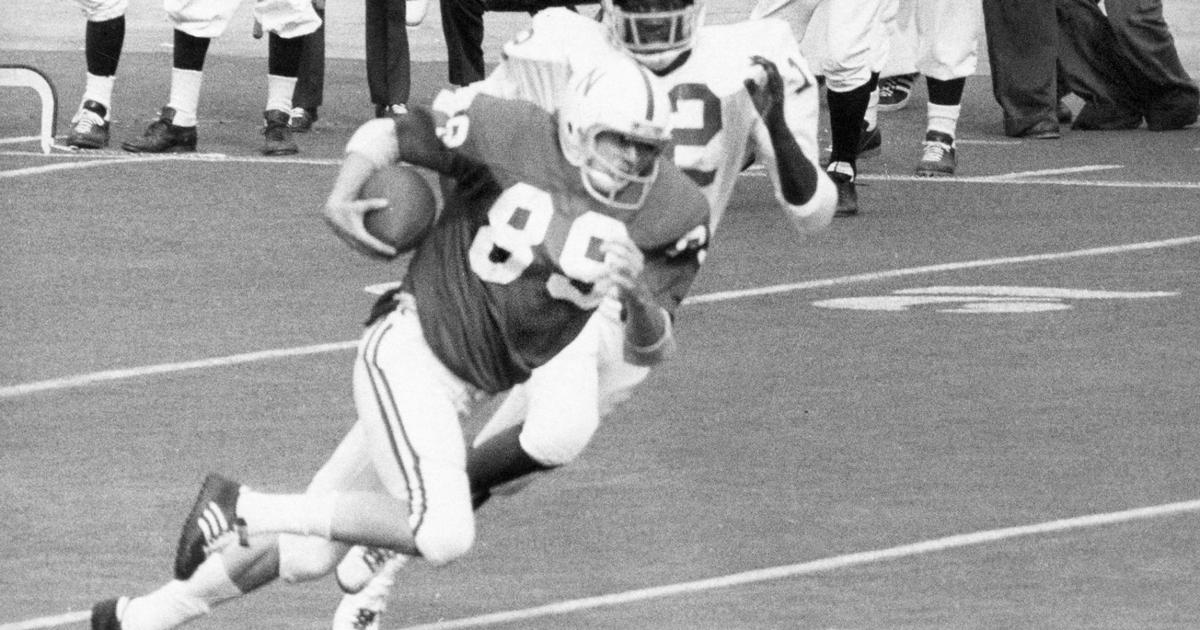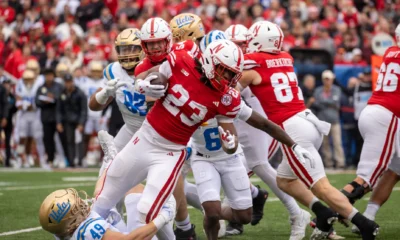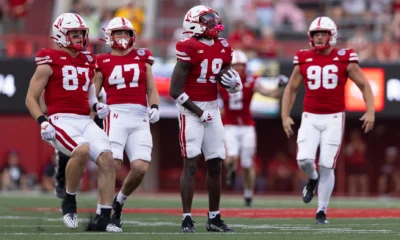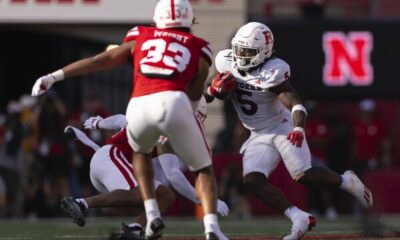
HOLDREGE — I was sitting at the high-top table at Fourth Avenue Coffee last summer when I stumbled down a rabbit hole I didn’t anticipate.
I was slowly making progress on building the database upon which the reporting for my “The Cornhusker State’ project was built, but when I’d run a name through the Journal Star archive, I would find a trove of interesting stories. I would read them.
The story of Albert Troyer, one of the founding fathers of Nebraska football, had my jaw on the floor. More on him in a minute.
For this project, it was absolutely impossible to fit everything in. The final word count for all seven stories? It hovers around 10,000 words. And I’m leaving so much out. Honestly, I should turn this all into a book. There’s plenty of material out there. Publishers? I’m listening.
Either way, I had more than 30,000 words of transcribed interviews for this project, and Lord knows I didn’t use over half of them. And that doesn’t even begin to delve into the rabbit holes I fell down while searching player names through newspaper archives or driving all over the state.
People are also reading…
With that in mind, here are 10 memorable things that didn’t make the cut, listed in chronological order based on their roster dates.
The plight of Albert Troyer
Albert Troyer was one of the 17 men on Nebraska’s first varsity football roster in 1890. From Dorchester, Troyer was a fullback and only played for that one season after he graduated with his bachelor of science in agriculture in 1891.
He, a citrus fruit expert, went to work as a consultant for the Russian government in 1934. While working there, he was arrested and then convicted on charges of “counter revolutionary action” and was sentenced to 10 years in prison as a 71-year-old man. But the United States couldn’t help him, because he renounced his United States citizenship to keep his appointment amidst the revolution.
Nothing more is known. There were no additional updates, meaning, he more than likely died in a Russian prison.
The legacy of George Flippin
The first Black Nebraska football player, George Flippin, came from Stromsburg. He was born in 1868 — just a few years after the end of the Civil War. Flippin suited up for the Old Gold Knights from 1891 through 1894. He, by all accounts, starred for Nebraska — but that didn’t come without pushback.
Nebraska was set to play Missouri in 1892, but Missouri forfeited the game because of Flippin’s mere presence on the roster. In 1894, Flippin was voted to be a team captain, but the coach at the time, Frank Crawford, wouldn’t stand for it, reportedly saying, “It takes a man with brains to be a captain: all there is to Flippin is brute force.”
After Flippin’s Nebraska tenure was over, he studied medicine in Chicago at the University of Illinois. After obtaining his medical degree, he later moved back to Stromsburg and founded the area’s first hospital. He died in 1929.
The mystery of Oliver Mickel
There’s a fullback on the 1902-03 rosters. His name is Oliver Mickel. He is not from Nebraska. Not even close. His hometown is listed as “Chihuahua, Mexico.”
International players, for football, are rare in the present day. But in 1902? By all accounts, I can’t figure that one out.
Lincoln Star archives call him a “Lincoln boy.” But maybe two Oliver Mickels were running around town at the same time. Stranger things have happened.
Willard Bunker’s career
Willard Bunker, of Lincoln, suited up at end for Nebraska in 1940 and then again from 1945-46. He lettered all three years.
During World War II, Bunker enlisted in the Army and fought in the Battle of the Bulge alongside the 28th Infantry Division and helped liberate France. He didn’t make it through the war unscathed, suffering “leg wounds” in Germany and was awarded the Purple Heart in 1945. He was awarded the Silver Star in 1944 in Belgium.
Many men in those days, if they were fortunate enough to make it home, came back to finish their academic and athletic careers. But seeing it written out like that was sobering.
The memory of Tom Osborne
For every player I interviewed for this project, I asked them what their first memory of Nebraska football was. So, in the waning moments of my chat with Osborne, I asked what his earliest Nebraska football memory was.
“I remember watching Nebraska-Kansas State,” he said with a laugh. “That might have been the first one I can remember. I think we lost, but that was a long time ago.”
He went on to say that he was likely a young elementary schooler, then, and that the price of a ticket in those days was 50 cents.
So, I went back and looked.
Sure enough, one year, Nebraska lost to Kansas State in the final game of the regular season. They lost 19-0 that year. That was the only time Nebraska lost at home to Kansas State during Osborne’s childhood.
Doing the math, Osborne would have been 5 years old that year. In 1942.
Absolutely remarkable that he remembers that.
Frosty Anderson (89) was part of two national championship teams at Nebraska.
Journal Star file photo
Frosty Anderson’s memorable throw
It’s a nondescript day in the 1970s. Nebraska’s in the middle of practice. It’s a special teams portion. And Frosty Anderson doesn’t play on the special teams units.
So he — a high school southpaw quarterback turned split end — was tossing the football around with then-backup quarterback Terry Luck. They were about 40 yards from one another before Anderson launched one.
“I’m off target as always,” Anderson said. “It’s off to the side and Coach Osborne is walking that way. And walking more. And Terry’s still standing there. And (Osborne’s) walking more and then? WHAM. It hits him right in the face and it dropped him.
“I sprint up there and they’re picking him back up and he’s kind of looking at me like, ‘Dadgumit, who threw that thing?’ And Terry says, ‘Coach, it might have been some of those freshmen down there.’ So I squirm away.”
Anderson didn’t get off scot-free.
The next day, he was lounging in the locker room before practice when Osborne came up to him.
“He comes right in my view,” Anderson recalled. “‘Frosty, did you throw that ball at me yesterday?’ ‘Yeah.’ ‘Why didn’t you tell me?’ ‘I wasn’t gonna say anything.’ I mean, how do you talk your way out of that? That hit him right in the cheekbone. His eye was blood red for three or four games.”

Johnny Rodgers crosses the goal line for a touchdown in the 1973 Orange Bowl against Notre Dame. Rodgers had a hand in three TDs that night, throwing for one, catching another and running one in from 4 yards out in his one and only start at I-back.
Journal Star file photo
Johnny Rodgers’ Heisman reflections
As a Heisman voter, any time I get to chat with anyone who’s been in contention for the award, let alone win the thing, I listen.
But for Rodgers, things were mighty different in 1972 when he became the first Husker and the first receiver to ever win the award.
“We didn’t really have a lot of emphasis on it,” Rodgers said. “I didn’t lay awake at night thinking about it or anything. But it stands out because it is able to stand the test of time and be the best award that it is.
“But, without having the team that I was fortunate enough to have had, I would not have had all the highlights. They were just as serious about getting a block for me as I was about getting away. They worked just as hard as I did. And it really brought to my attention that anything you can do by yourself ain’t big enough.
“You don’t win national championships by yourself. You don’t have the Heisman Trophy by yourself. You don’t build great teams by yourself. It’s always in conjunction with others. That’s where you make your greatest accomplishments. Teamwork makes your dreams work. Throughout life and football.”
Words to live by, for sure.
David Seizys’ senior day
It’s Nov. 26, 1993. Vs. Oklahoma. Senior day.
For David Seizys, it’s his favorite memory.
No. 2 Nebraska went up 14-7, and on that next kickoff, Seizys had his moment. He can see a full-tilt Mike Minter out of the corner of his eye — racing straight toward the Oklahoma ball carrier. The ball pops out and Seizys dives on top of it.
“It took quite a bit of time to get out of the pile and come out of it,” Seizys said. “Calvin Jones scores on the next play, 49 pitch. We go up 21-7. Basically sealed the ball game. I’m like freaking out, but I have to calm down because I have to go hold, so I’m in this emotion of like, ‘Oh my gosh.’”
On the next kickoff, Seizys made the tackle.
The score held. Nebraska won, 21-7 — solidifying the Huskers’ chance to play in the Orange Bowl.
“It was unbelievable. Unbelievable,” Seizys said. “So my dad passed away last August. He had written me a letter that I still have that he said, ‘I have been praying that you would single-handedly have your hand in winning a game before your career was done. And it came on senior day.’”

Garth Glissman (left) is chased by Adam Carriker (center) and Jay Moore during the 2004 Red-White Spring Game at Memorial Stadium.
Journal Star file photo
Garth Glissman’s mindset
In an alternate universe, Lincoln’s Garth Glissman — now the associate commissioner of the Southeastern Conference — would have played college basketball somewhere.
But his fates changed on the third day of basketball practice his senior year of high school at Waverly. He, as high schoolers do, went to dunk over a teammate and on his way down, he suffered a double dislocation and fracture of his right ankle. Instead of worrying about his Division I basketball career, he was worried about possibly losing his foot.
Surgeons at Nebraska Orthopedic saved his foot, but all but one of the schools recruiting him backed off. All but Dartmouth. But they wanted to see if he could still play on his injured ankle, so they nudged him toward a prep school in New Hampshire for a year.
But before basketball season rolled around, Glissman, a quarterback, had a breakout season on the gridiron. Boston College looked at him. So did the Ivies. Nebraska was in the mix for him in basketball.
“I couldn’t pass up a chance just to come back to Nebraska as an invited walk-on for basketball,” Glissman said. “But I was, intellectually, very torn because I knew I was a better football player by that point in my life. So I went back to Nebraska, but I was kind of wrestling with what sport I should be playing.”
Glissman, with Barry Collier’s blessing, ultimately chose football after redshirting for one season with hoops.
But as we sit years later, reflecting on the past, Glissman brought up a Chinese fable Tom Brady likes to share.
A farmer’s horse ran away. Soon after, his neighbors come by to share their sympathies. “How horrible that your horse ran away,” they said, only for the farmer to respond, “We’ll see.”
But the horse came back. And 10 wild horses were with him. The neighbors saw this and said, “How lucky!” And the farmer replied, “We’ll see.”
The next day, the farmer’s son is trying to break the wild horses when he’s bucked off and injures his leg. The neighbors saw this and said, “How horrible that this happened to your son,” only for the farmer to reply, “We’ll see.”
The next morning, the Army has come to town. There’s a war and all the young men are being drafted. But when they arrive at the farmer’s house, they see that the son has a broken leg and he cannot fight. The neighbors saw this and said, “How lucky for your son that he does not have to go to war.” The farmer replies, “Maybe.”
For Glissman, it’s apt. If not for his broken ankle, he wouldn’t have gone to that prep school. If not for the prep school, he wouldn’t have had that breakout season at quarterback. He wouldn’t have returned to Nebraska where he ultimately played football.
“I believe there was a fair amount of divine intervention in that because at the time, it seemed devastating to me, but as it turned out, it led me on this winding path that allowed me to fulfill a childhood dream,” Glissman said. “But I don’t even know if it was necessarily a childhood dream because it felt so out of reach.”
The present
What do Kyle Larson, Jared Crick, Brett Maher and Scott Kriewald have in common?
They’ve all moved back to Nebraska.
Larson, originally from Funk, lives in Kearney. Crick lives in Cozad, his hometown. Maher, who went to Kearney High, lives in Lincoln. Kriewald lives in Scotia, his hometown.
All of them had NFL careers of varying lengths.
Maher has spent 11 years playing professional football, living in New York, Dallas, Winnipeg, Ottawa, Hamilton, Cleveland, Washington D.C., Houston, Arizona, New Orleans, Denver and Los Angeles. And that’s with repeat stops in Ottawa, Dallas, New York and Dallas again in between.
Crick played in Houston and Denver. Larson played for Cincinnati. Kriewald spent a training camp in Tampa Bay.
But all of them moved back home, or close to it, anyway. Why??
“I’ve always taken so much pride in saying that I’m a farm boy from Funk, Nebraska,” Larson said. “I love being back home. I work right in the county I grew up in. You get to see a lot of the people that I grew up around on a regular basis. It’s fun. Really neat.
Maher said: “When my oldest got into Kindergarten, that’s when we bought a house here. This is going to be home.”
For Crick, it’s a longer answer.
“We told ourselves once football was over, whenever that was, we’d probably move back to Omaha or Lincoln and stay there until we figure something else out,” Crick said. “We thought about staying in Houston.”
And then he signed with Denver — a much more expensive city to live in than Houston. So, he and his wife, Emily, settled on the move-back-to-Nebraska idea.
“And then we had our little boy. And that’s when we realized, ‘Oh, it’d be nice to be around family,” Crick said. “Both her parents and my parents are in Cozad. My little boy — both boys now — but at the time, just the one little boy, all his cousins were in Cozad. So, we were like, ‘Let’s go back to Cozad for a little bit and then we’ll figure out what we want to do.’”
As the weeks turned into months and the months turned into years, the Cricks decided that living in Cozad came with plenty of perks.
“We kinda like it because my little boy gets to play with his cousins every day,” Crick said. “If we ever need a babysitter, we’d hand him off to a grandparent. And then we had a second kid and it’s like, ‘Well, let’s just stay here because obviously it’s gonna be hard to leave somewhere with two kids. We’re already playing man-to-man already.’”
Each boy left Lincoln in chase of football aspirations, but home always beckoned.
Photos: Nebraska football practice at Hawks Championship Center — Aug. 16

Nebraska’s Thomas Fidone picks up a pass during a team practice on Friday, Aug. 16, 2024, at Hawks Championship Center.
JUSTIN WAN Journal Star

Nebraska offensive coordinator Marcus Satterfield coaches tight ends, including Connor Schutt (46), during practice on Friday at Hawks Championship Center.
JUSTIN WAN, Journal Star

Nebraska defensive coordinator Tony White talks with the team during a practice on Friday, Aug. 16, 2024, at Hawks Championship Center.
JUSTIN WAN Journal Star

Nebraska’s Thomas Fidone (right) outruns teammate Mikai Gbayor during practice on Friday at Hawks Championship Center.
JUSTIN WAN, Journal Star

Nebraska’s Nash Hutmacher (left) and Keona Davis walk into a patch of light during a team practice on Friday, Aug. 16, 2024, at Hawks Championship Center.
JUSTIN WAN Journal Star

Nebraska’s head coach Matt Rhule talks with a New York Giants staff during a team practice on Friday, Aug. 16, 2024, at Hawks Championship Center.
JUSTIN WAN Journal Star

Nebraska head coach Matt Rhule smiles as he talks by the sidelines during a team practice on Friday, Aug. 16, 2024, at Hawks Championship Center.
JUSTIN WAN Journal Star

Nebraska’s Dylan Raiola (from left), offensive coordinator Marcus Satterfield and Thomas Fidone seen during a team practice on Friday, Aug. 16, 2024, at Hawks Championship Center.
JUSTIN WAN Journal Star

Nebraska’s Emmett Johnson catches a pass during practice on Friday at Hawks Championship Center.
JUSTIN WAN, Journal Star

Nebraska’s Nate Boerkircher catches a pass during practice on Friday at Hawks Championship Center.
JUSTIN WAN, Journal Star

Nebraska’s Jalyn Gramstad looks to make a throw during a team practice on Friday, Aug. 16, 2024, at Hawks Championship Center.
JUSTIN WAN Journal Star

Must See
-


Football
/ 4 months agoHuskers Fight Hard but Fall Short Against UCLA
LINCOLN – The Nebraska Cornhuskers gave it their all on Saturday, with standout efforts...
-


Football
/ 5 months agoGAMEDAY: Nebraska Set to Face Undefeated Indiana in Key Big Ten Showdown
Bloomington, IN – It’s Game Day, Husker Nation! Nebraska (5-1, 2-1 Big Ten) returns...
-


Football
/ 5 months agoBlackshirts Shine as Nebraska Tops Rutgers 14-7 on Homecoming
Lincoln, NE – Nebraska’s Blackshirt defense played a starring role in the Huskers’ 14-7...
By Chris















You must be logged in to post a comment Login